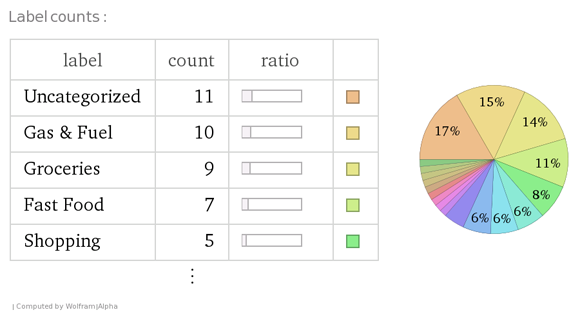Here are a few of the data stories that caught my attention this week:
Wolfram|Alpha Pro: An on-call data scientist
The computational knowledge engine Wolfram|Alpha unveiled a pro version this week. For $4.99 per month ($2.99 for students), Wolfram|Alpha Pro offers access to more of the computational power “under the hood” of the site, in part by allowing users to upload their own datasets, which Wolfram|Alpha will in turn analyze.
This includes:
- Text files — Wolfram|Alpha will respond with the character and word count, provide an estimate on how long it would take to read aloud, and reveal the most common word, average sentence length and more.
- Spreadsheets — It will crunch the numbers and return a variety of statistics and graphs.
- Image files — It will analyze the image’s dimensions, size, and colors, and let you apply several different filters.

Wolfram|Alpha Pro subscribers can upload and analyze their own datasets.
There’s also a new extended keyboard that contains the Greek alphabet and other special characters for manually entering data. Data and analysis from these entries and any queries can also be downloaded.
“In a sense,” writes Wolfram’s founder Stephen Wolfram, “the concept is to imagine what a good data scientist would do if confronted with your data, then just immediately and automatically do that — and show you the results.”
 Strata 2012 — The 2012 Strata Conference, being held Feb. 28-March 1 in Santa Clara, Calif., will offer three full days of hands-on data training and information-rich sessions. Strata brings together the people, tools, and technologies you need to make data work.
Strata 2012 — The 2012 Strata Conference, being held Feb. 28-March 1 in Santa Clara, Calif., will offer three full days of hands-on data training and information-rich sessions. Strata brings together the people, tools, and technologies you need to make data work.
Crisis-mapping and data protection standards
Ushahidi‘s Patrick Meier takes a look at the recently released Data Protection Manual issued by the International Organization for Migration (IOM). According to the IOM, the manual is meant to serve as a guide to help:
” … protect the personal data of the migrants in its care. It follows concerns about the general increase in data theft and loss and the recognition that hackers are finding ever more sophisticated ways of breaking into personal files. The IOM Data Protection Manual aims to protect the integrity and confidentiality of personal data and to prevent inappropriate disclosure.”
Meier describes the manual as “required reading” but notes that there is no mention of social media in the 150-page document. “This is perfectly understandable given IOM’s work,” he writes, “but there is no denying that disaster-affected communities are becoming more digitally-enabled — and thus, increasingly the source of important, user-generated information.”
Meier moves through the Data Protection Manual’s principles, highlighting the ones that may be challenged when it comes to user-generated, crowdsourced data and raising important questions about consent, privacy, and security.
Doubting the dating industry’s algorithms
Many online dating websites claim that their algorithms are able to help match singles with their perfect mate. But a forthcoming article in “Psychological Science in the Public Interest,” a journal of the Association for Psychological Science, casts some doubt on the data science of dating.
According to the article’s lead author Eli Finkel, associate professor of social psychology at Northwestern University, “there is no compelling evidence that any online dating matching algorithm actually works.” Finkel argues that dating sites’ algorithms do not “adhere to the standards of science,” and adds that “it is unlikely that their algorithms can work, even in principle, given the limitations of the sorts of matching procedures that these sites use.”
It’s “relationship science” versus the in-take questions that most dating sites ask in order to help users create their profiles and suggest matches. Finkel and his coauthors note that some of the strongest predictors for good relationships — such as how couples interact under pressure — aren’t assessed by dating sites.
The paper calls for the creation of a panel to grade the scientific credibility of each online dating site.
Got data news?
Feel free to email me.
Related:
